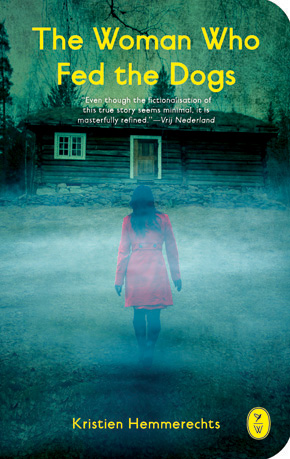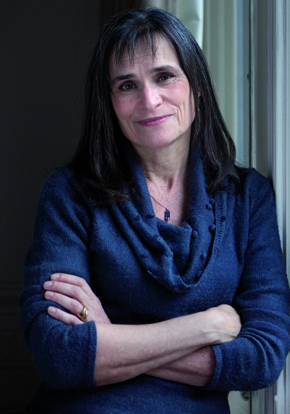Out of the cellar
by Kristien Hemmerechts
“A compelling narrative.” Blake Morrison
I wish I could say that The Woman who Fed the Dogs is the hardest novel I have ever written, but the opposite is true. It is the most distressful, but that’s a different matter. The novel is conceived as a monologue and tries to imagine what might have gone on in the mind of one of Belgium’s most notorious offenders at a crucial moment in her life. In the summer of 2012 it became clear that Michelle Martin, ex-wife and accomplice of child murderer and rapist Marc Dutroux, was about to be conditionally released after serving sixteen years in prison, just over half of her sentence. As had happened at the time of her arrest, and again at the time of her trial, the papers were awash with articles about ‘the most hated woman in Belgium’, who had failed to bring food to Julie and Melissa, the eight-year-olds kept captive in the cellar of her husband’s house, while he was serving a prison sentence for car theft. Although married with three children, Martin and Dutroux did not live under the same roof. Her house was half an hour’s drive away from his. As instructed by him, she regularly went to check on his house and pick up the mail. Following a burglary she brought over her dogs, and apparently regularly drove over to feed them, but she did not bring food to the girls. I write ‘apparently’ because many elements in this case remain unclear. One hypothesis has it that the girls had already died when Dutroux was sent to prison. That seems likely to me, although one wonders what kept and keeps Michelle Martin from telling this in her defence. Either way, Dutroux kept Martin abreast of his actions and she never alerted the police, nor did she undertake anything to save the girls.
To a certain extent the truth has become irrelevant. Michelle Martin will go down in history as the woman who fed the dogs, but failed to feed the children. This fact has taken firm root in the collective consciousness and nothing can uproot it. And there can be no forgiveness. How could a mother of three let those girls starve? How indeed?
At first I did not concern myself with that question. Instead I wondered what it was like for her reading about herself, seeing again the pictures of her leaving court handcuffed and in a bulletproof jacket. I imagined her studying those pictures,
When a child has been murdered, parents are the prime suspects. Statistically chances are that a parent is the murderer. In 2007 a Belgian woman, Geneviève Lhermitte, killed her five children with a knife. She is serving a life sentence in prison, but she is not hated. A film was made about her, Our Children, but in spite of that she seems to be largely forgotten. I had my fictionalised Michelle Martin obsess about this woman. I let her ask the question: How can a mother do such a thing? How indeed?
I don’t know whether the real Michelle Martin ever spares a thought for Geneviève Lhermitte. As part of the conditions of her release she is not allowed to give interviews. Her lawyer told me so when I contacted him by phone. He sounded weary, as if he was besieged on a daily basis by writers and journalists with similar requests.
Michelle Martin has been called a hypocrite, but I believe in the sincerity of both her devotion and her maternal feelings. The cruelty and the compassion coexist.”
Fortunately I could hear her voice in the letters she wrote to her mother when she was first incarcerated. She begs her mum to send money so she can phone her children. The oldest one was eleven at the time, the second was three and then there was a nine-month-old baby. Her anguish is palpable: Who is looking after her children? How are they? What will happen to them? About the murders she writes: “I think it’s dreadful for those parents to have lost their children. That’s the worst thing that can happen to a person. I’m a mother too, I suffer for them. Not a day goes by that I don’t think of them.” That quote I included in my novel, and also this one: “I have always wanted the best for everyone, bearing in mind the words of the Gospel: ‘Therefore all things whatsoever ye would that men should do to you, do ye even so to them.’” (Matthew 7:12)
Michelle Martin has been called a hypocrite, but I believe in the sincerity of both her devotion and her maternal feelings. The cruelty and the compassion coexist. That seems hard to swallow until you stop and analyse your own moods and behaviour, and dwell on their myriad inconsistencies. We can be many different things at the same time, our deeds and our principles can be in blatant contradiction. Viewed in that light, Martin appeared to be no different from ‘ordinary’ people. What makes her case exceptional are the extraordinary circumstances and the tragic outcome. Her attitude can be described as a toxic mix of fear, selfishness, depression and denial. I am convinced that she repressed the presence of those kids in the cellar. That stark reality was too big for her to live with. She didn’t want to know.
It was painful trying to get as close as possible to the moment she entered into the house and did not go down into the cellar. I pictured her standing in front of the door with the baby, the toddler and the kid, and the food for the dogs, and the latchkey. I had tears running down my cheeks because I so much wanted to save the girls. And I couldn’t. At the same time I could clearly see how it had happened. Or may have happened.
Giving her an inner voice wasn’t hard. I just had to recall the voices that I had heard in my childhood. Michelle Martin and I grew up in the same area. She’s four years and five months my junior. Until she was five she lived within walking distance from my home. We may have crossed one another in the street. When I read about her mother, I immediately knew the type. I recognised the importance of keeping up appearances, the hidden life behind closed shutters, the hysteria. Before I embarked on this book, I thought of Martin and Dutroux as living on a different planet, the planet of evil, but they lived next door.
I called her ‘Odette’ because the character in the novel is my creation, a creation based on facts and testimonies, but also on imagination, empathy and conjecture. I asked myself questions which she probably would never answer even if I had the chance to put them to her: What is it like to share a bed with a man you know to be a rapist? What fantasies does it produce? I figured there must have been a time when she was infatuated with him. I wanted to imagine her euphoria upon meeting him and celebrating her escape from her dominant mother. Little did she know what he had in store for her.
Many people have asked me why I have written the novel. Think of me as an anthropologist, I reply. I study human behaviour, I want to understand its ins and outs, which does not imply approval. Of course I don’t approve of what she did or failed to do. Who would? But I think I now understand how it came to pass.
We tend to repress all that is unpleasant. We prefer not to talk or think about it. We push it into the cellar. But it won’t go away. Besides, evil resides in all of us, it is not an external force that we can capture and kill. As Hannah Arendt taught, it is distressingly banal.
 Kristien Hemmerechts was born in Brussels in 1955 and has written twenty novels, several collections of short stories and autobiographical essays in which she doesn’t shy away from controversy. She has been awarded the Flemish State Prize and the Frans Kellendon Prize and works as a professor in English literature at the Catholic University of Brussels, and Creative Writing tutor at the Herman Teirlinck Institute in Antwerp. The Woman Who Fed the Dogs, translated by Paul Vincent, is published by World Editions. Read more.
Kristien Hemmerechts was born in Brussels in 1955 and has written twenty novels, several collections of short stories and autobiographical essays in which she doesn’t shy away from controversy. She has been awarded the Flemish State Prize and the Frans Kellendon Prize and works as a professor in English literature at the Catholic University of Brussels, and Creative Writing tutor at the Herman Teirlinck Institute in Antwerp. The Woman Who Fed the Dogs, translated by Paul Vincent, is published by World Editions. Read more.
Author portrait © Keke Keukelaar

